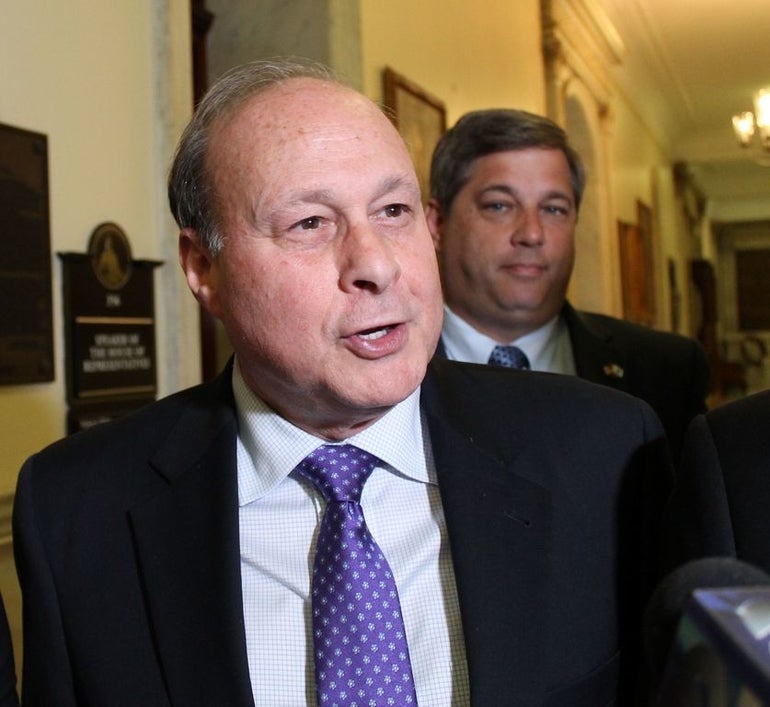Senate President Stanley Rosenberg spoke on Monday in favor of raising the taxes on the highest earners in the state.
Rosenberg on Monday described to a breakfast crowd of organized labor representatives his vision of how the Senate can “continue pushing the envelope” on minimum wage increases, efforts to close the gender pay gap and workers’ rights.
The Senate’s top Democrat also detailed how the Senate’s work on education, transportation and housing issues is laying the groundwork for a debate over a constitutional amendment adding a 4 percent surtax on incomes above $1 million.
“We need to rebuild the middle class in America and Massachusetts. We can’t do it without the investment in education and transportation and housing and energy, and it’s going to require us to shift the paradigm and change people’s minds that they can and should support a change in the constitution to allow us to change the tax system so that those who earn the most pay the most,” Rosenberg told the Greater Boston Labor Council’s breakfast Monday morning at the Omni Parker House.
Raise Up Massachusetts is the group behind the proposed amendment, which the Department of Revenue has estimated would generate between $1.6 billion and $2.2 billion in additional paid by roughly 19,500 filers representing half of 1 percent of all tax returns. Eighty-six percent of the affected taxpayers would be married couples filing jointly, and 11 percent would be individual filers with earnings over $1 million, according to the state’s estimates.
Rosenberg, a longtime advocate of a graduated income tax structure, explained how the Senate has formed working groups to study issues and make policy recommendations. The working group looking at housing issues recently issued its report, a group of senators studying charter schools and the education funding system last week released a reform bill, and Rosenberg said he expects a group delving into transportation matters will have a full report ready in about a year.
Armed with those reports laying out the needs of the state’s education and transportation systems, he said, supporters will have the ammunition needed to convince the public, especially working class citizens, to vote for the constitutional amendment.
“When we have the education plan and we have the transportation plan, we’re going to have all the elements we need to be able to go out and argue for the fair share tax plan,” Rosenberg said.
The constitutional amendment could go before voters in November 2018 at the earliest. On Wednesday, Beacon Hill lawmakers will have the chance to push the citizen petition forward when they meet in a joint session of the Legislature. To reach the 2018 ballot, at least 50 lawmakers from the House and Senate must vote in consecutive sessions to advance the amendment.
Rosenberg presides over the Constitutional Convention. On Monday he was again non-committal about how far into the calendar the joint session will go on Wednesday. The 4 percent surtax proposal is behind four other proposed amendments on the joint session’s calendar.
“I’m not sure we can get that far. But if we do, we do,” he told the News Service. “There’s going to be debate on a number of other items.”
According to the Massachusetts High Tech Council, establishment of the higher tax bracket would place Massachusetts below only California and Minnesota as one of the highest top-tax-rates among “peer technology” states. The council also contends that if lawmakers advance the amendment and it is approved by voters, the Legislature’s hands will be tied for many years because income tax thresholds will be enshrined in the constitution, which is difficult to amend.
The convention last met on Feb. 3. During that gathering, which lasted less than two hours, lawmakers dispensed with four amendments, rejecting two and postponing consideration of two others.
Rosenberg’s comments Monday about the so-called “millionaire’s tax” were cloaked in the broader debate over income inequality, an issue that has been a constant topic of conversation on Beacon Hill this session and across the country.
Noting President John F. Kennedy’s work to address income inequality in the 1960s when a woman earned just more than half of what her male co-worker took home, Rosenberg touted the Senate’s passage in January of a bill (S 2107) that proponents say would strengthen the state’s pay equity law in an attempt to close the gender pay gap.
“We can’t take another 50 years to finish that job and to close that gap,” Rosenberg said. “I’m hoping the House of Representatives will take up that bill and we’ll send it to the governor and we’ll test the governor’s mettle and his fairness when that bill comes before him.”
The Senate president also hinted at the possibility of a minimum wage hike bill reaching the floor for a vote this session.
During Senate leadership talks, Sen. Daniel Wolf, who chairs the Joint Committee on Labor and Workforce Development, has been discussing three variations of a bill that would boost the minimum wage to $15 per hour for certain workers, Rosenberg said.
Senate leaders are in the process of talking to members about the bills, Rosenberg said, “to determine whether we might be able to move forward during this remaining few months in formal session.”
A Senate-approved minimum wage hike would likely face an uphill climb in the House, where Speaker Robert DeLeo has said he doesn’t see how his branch would take up a wage increase so soon after voting in 2014 to hike the hourly minimum wage throughout the state to $11 by next January.
Gov. Charlie Baker has not taken a position on the surtax amendment, but ran on a campaign platform pivoting on his opposition to new or higher taxes. Baker touted the absence of higher taxes in his $39.55 billion fiscal 2017 budget. House Speaker Robert DeLeo has ruled out higher taxes in the House budget that will be unveiled this month and which he says is expected to call for only a 3 percent spending hike.

